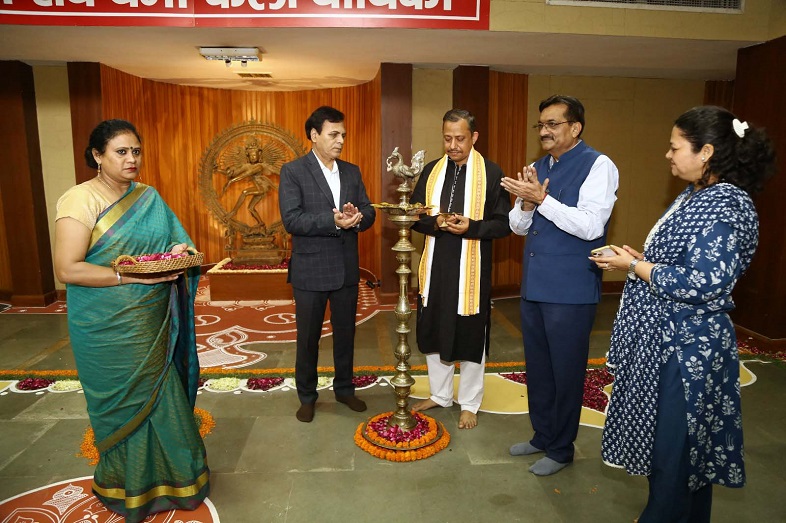9th VIRASAT KAMALADEVI- A Cultural Festival to honour the memory of Kamaladevi Chattopadhyay from March 24th to 27th, 2023

Centre for Cultural Resources & Training (CCRT) organised a four days’ cultural festival titled ‘VIRASAT – Kamaladevi’ to honour the memory of Smt. Kamaladevi Chattopadhyay, Founder & First Chairperson of CCRT from March 24th to 27th, 2023 in CCRT Campus Dwarka, New Delhi.
According to Shri Rishi Vashist Director CCRT, “VIRASAT is a tribute to our founder Smt. Kamaladevi Chattopadhyay. She was an inspiration and CCRT carries forward her legacy through this festival. VIRASAT comes at an appropriate time which PM Modi calls as the ‘Amrit Kaal – a period when Vikas and Virasat should go hand in hand’. India’s voice is now more confident and assertive and this is reflected in the G20 and the leadership position the country is taking in global matters. Indian culture has the potential to benefit the global citizen today and the world can imbibe our deep and meaningful time-tested practices, ancient wisdom, music, dance, wellness practices or the spiritual side of culture. Amrit Kaal has set the tone for the cultural renaissance of India and VIRASAT is a step to reinforce the prowess of our heritage.”
Day 1 of VIRASAT Kamaladevi 2023 festival started with inauguration of Amrit Camp and a lamp lighting ceremony by Dr. Vinod Narayan Indurkar, Chairman CCRT and Shri Rishi Vashist, Director CCRT. In the evening a play ‘Pahatiya’ was staged which was about an unsung hero from India’s independence movement Gend Singh from the state of Chhattisgarh.
The Second Day, Saturday, March 25th, 2023, of VIRASAT Kamaladevi festival saw the declaration of CCRT’s DDR (Digital District Repository) brand ambassadors and their felicitation in a Facebook Live program. This was not just online, but was also offline at the Bharatmuni Natyagriha auditorium from 4pm to 6pm. The stars of the show were Maharashtra’s Dr Shivaji Mhaske, Andhra’s Somisetty Sarala, Haryana’s Prakash Sangwan who have written over hundred stories for Project DDR- celebrating unsung heroes, events, hidden treasures, living traditions- that have contributed in some way to India’s independence movement/ freedom struggle. Dr. Sandhya Purecha, Chairperson- Sangeet Natak Akademi and Chair, W-20 was the Chief Guest for the DDR Program held Live at 4pm at CCRT campus and she felicitated the three brand ambassadors of Project DDR. About the festival, Dr Purecha said, “Kamaladevi was a vidushi (scholar) and to have a festival in the name of this legend is a big thing. And this is exactly what our culture is. It is to carry forward the legacy of the past into the present.” The evening witnessed a gripping suspense drama called “Ek Inspector Se Mulaqat” which was conceptualised and directed by Sharad Sharma of Abhinav Rangmandal, Ujjain, Madhya Pradesh.
Day 3 saw two riveting outstanding plays. The first was ‘Sardar’ based on the story of Sardar Patel, directed by Shri Ramji Bali, Theatre Wala Varanasi, Uttar Pradesh. The second play was ‘Sandhya Chhaya’ directed by Shri Sudesh Sharma, Theatre for Theatre, Chandigarh. Sandhya Chhaya was the story of an old couple, a poignant tale of their loneliness which made the audience laugh and cry- and the audience could not stop clapping at the end of the play and even gave a standing ovation to the entire cast. Says Maira Bhatt, a 21 year old student of IP University who had come to see the play, “It was an eye opener for me about how elders feel when their children go away. A range of emotions were portrayed by the old couple, be it happiness, sadness, love for kids, their childhood, their insecurity about their own future. It made us cry but there were many funny scenes too such as the banter between the old couple.”
Day 4 started with “Siddhi Samaroh” or Valedictory program with Chief Guest Dr Shripad Bhalchandra Joshi, senior Marathi poet and writer and Guest of Honour – Smt Uma Nanduri, Joint Secretary, Ministry of Culture. The chief guest unveiled the statue of Smt. Kamaladevi Chattopadhyay and inaugurated the exhibition of 30 paintings of women freedom fighters in the CCRT Art Gallery. Soon after this, a cultural Presentation ‘Amrit Camp’ was made by CCRT’s scholarship holders in conclusion of the Amrit Camp: Kadam Kadam Badhaye Ja. Forty-two children from tribal regions of Udaipur, Rajasthan; 20 children from Varanasi interpretation centers and 18 CCRT Scholarship holders showcased a synchronized cultural production in classical music, dance and traditional art form along with a visual art exhibition. The theme of the visual art exhibition was ‘Unsung Heroes of India’ in unique Indian folk-art styles such as Pichwai and Madhubani painting, where students used charcoal and mixed media. The theme of folk theatre and folk dance is Ghoomar, a feminine and elegant dance form of the royal families performed during the family festivities using instruments such as shehnai, nagada, dhol and harmonium. The theme of classical music production was ‘Regional songs of India commemorating unity of India’ and classical dance production was ‘Maine Mrityu ko dekha.’
The Amrit Camp was followed by a ramp walk event ‘Rangi Ramani’ curated by Deepali Phadnis, a choreographer who has organized several Mrs. India Contests. There was a ramp walk by those women artists in those Kerala’s Kasava sarees, they had painted with women freedom fighters on it.
This was followed by book release of a book series on Lesser-Known Cities of India ‘Santon Ka Shahar- Hoshiyarpur’ and a book series on Sanjhi Sanskriti Ke Nirmata ‘Taj Bibi’, followed by documentary film such as CCRT’s New Institutional Video and Dharohar (P Vetriboopathy).
The Ninth Kamaladevi Chattopadhyay Memorial Lecture was delivered in the evening by Prof Shrinivasa Varakhedi, Vice Chancellor, Central Sanskrit University, Delhi on “Kala, Sanskriti Evam Sanskrit.” The evening witnessed two plays by Nagpur based theatre group – ‘Chidiya, Chhilke aur Sahgal’ and ‘Bhatki Gazal’- both directed by Dr Vinod Narayan Indurkar, National Art & Craft Creator Nagpur, Maharashtra who is currently also the Chairman CCRT. The first play ‘Chidiya, Chhilke aur Sahgal’ revolved around Shree and Shirin- a boy and girl who at one time were in a romantic relationship and later went their separate ways and how they suddenly bumped into each other and recounted their past. In the second play ‘Bhatki Gazal’ the plot revolved around four characters and their interpersonal relationship. The play was a take on the desire of the modern man and the real world and the conflict thereof and the existential crisis.
About CCRT: Centre for Cultural Resources and Training (CCRT) (www.ccrtindia.gov.in) is one of the premier institutions working for strengthening the foundations of Bharat by linking education with culture. CCRT’s mandate is to incorporate cultural components in curriculum teaching by conducting a variety of training programmes for in-service teachers, Teacher Educators, educational administrators and students throughout the country. It also provides Scholarships and Fellowships to promote outstanding talent in the field of art and culture across different age groups.

